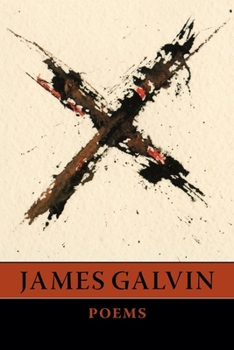X: Poems
Select Format
Select Condition 
Book Overview
"X" is the kiss and betrayal, the embrace, the crucifixion, the mathematical unknown. In his sixth book of poems, James Galvin writes from a deep, philosophical engagement with the landscape and faces a "vertigo of solitude" with his marriage dissolved, his only daughter grown and gone, and the log house he built by hand abandoned. "What did I love that made me believe it would last?" he asks. Something has to be true enough to be
Taken...
Format:Paperback
Language:English
ISBN:1556591918
ISBN13:9781556591914
Release Date:May 2003
Publisher:Copper Canyon Press
Length:96 Pages
Weight:0.30 lbs.
Dimensions:0.2" x 6.1" x 8.9"
Related Subjects
PoetryCustomer Reviews
4 ratings
Amazing Beautiful Vituperative Work; Galvin makes Poetry Real
Published by Thriftbooks.com User , 14 years ago
This book of poetry moved me in a way that (post)-modern poetry doesn't. While I do know Galvin and his daughter, his writing has made me admire him as well as his strength of character and general demeanor. His writing matches his persona in this respect, and is notable as it's not cerebral, or convoluted-it's straightforward, brilliant, and beautiful--even in relating some of the most painful experiences he's endured. Also, as a side note, Galvin writes a substantial amount of work in Iowa, where he's a professor at the famous University of Iowa Writer's Workshop. Not as inspiring as Wyoming, but a great place just the same, where many writers began their careers and wrote some of their best work.
A Nightingale In Wyoming
Published by Thriftbooks.com User , 21 years ago
A long time has past since John Keats slouched beneath a nightingale's nest in a plum tree to bemoan a world "Where but to think is to be full of sorrow/and leaden-eyed despairs/Where beauty cannot keep her lustrous eyes/Or new love pine at them beyond to morrow." In our cool age, merely to think of any contemporary poet attempting to revisit themes endemic to lyric poetry since Sappho-desire, betrayal, trust, loss, loneliness and nature-awakens us to just how awesome a challenge it has become to say "my heart aches" without encountering a sea of guffaws. But there is a nightingale in Wyoming, perched on a windowsill somewhere around James Galvin's ranch, and, as his sixth volume of poetry attests, he hears it loud and clear. Throughout "X," a collection of poems dwelling largely on his defunct marriage with fellow poet Jorie Graham, Galvin relies on the reader's own conscience and experience to finish each poem's meaning and affect, often transcending this basic rule of poetic law by digging deeper, excavating past losses and interrogating the difficult present, the struggle to go on. "After bad things happen we always live/A little more," Galvin observes in a language as simple as it is moving. Routinely, Galvin steps out of the way of his poems to let them speak their way out of loss, stifling so much as a jaded chuckle in the textured silence following every final line. If the trick to conveying heartbreak convincingly in contemporary poetry is to simply tell what happened, rather than wrestling readers into feeling your pain, "X" provides ample instruction:So out of love with life am INo future will have me.How can you lose a lie?Well, you can. Easy.All those years together, it seems,Were posturings of goodbye.For a time I raved.Now I dwell in moods and reveriesLike frightened birds-Galvin's bursts of thwarted longing are calculated with such tact and precise timing that they leap off of the page. By the time he gets around to saying, simply, "You are in love with/someone else" or "Why aren't you in love with me," the stage has already been so patiently set for a heaving sigh of empathy that only the dead could turn the page without at least a quiver in the chin. "Everyone drifts/in their disastrous bodies," Galvin writes in the book's first poem, "Little Dantesque." Just midway into this opening poem, the reader already has little reason to suspect that Galvin's lines are anything less than flakes chipped from a soul in smolder. "Love's not love until it's lost," he writes in a later poem. The body and its carriage of lusts has indeed proven disastrous, as the "threadbare" speaker continually "drifts" along an impasse of things that were: "I had a happy medium/Had her reading out of my palm/The circus folded up and left."Inevitably, there are fleeting descents into mushiness and melodramatics, as when Galvin signs off the poem "Dear May Eight," "Yours, May Eighth /Sincerely/Man under influence of sky." Additionally, a couple of poems read
Powerful, a bit single noted
Published by Thriftbooks.com User , 21 years ago
Wonderful poet...I buy and read everything he writes, including his fiction/prose. Significant center section of this book is Galvin's (character's? or is it unabashedly autobiographical?) artful, moving...but ultimately 'one note'...crie de ceur about the betrayal of 'his'/his wife, implied divorce, and loss of daughter living in the same household. (I'm betting that in the somewhat small world of American poets there is a connection here to Galvin's previous marriage to another poet.) I suspect that when there is a selected poems, some of these will be retained, others dropped. The stronger poems are effective from every perspective. I was glad to see that some of Galvin's earlier concerns about the larger natural world appear here in the collection as well.
Best
Published by Thriftbooks.com User , 21 years ago
Amazing, beautiful, heartfelt and lyrically stunning. This work may not only mark a personal best for the author, but for the decade as well. One to read and one to remember. To be honest, there is nothing to say but what is said, and so I'll be brief: don't miss it.





